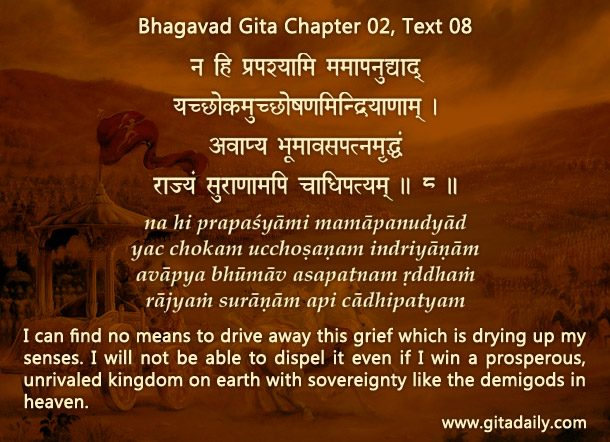When people fall sick, a lot of their misery comes from resenting their sickness, “Why am I suffering when everyone else is enjoying?” Such resenting doesn’t just add emotional misery to the physical misery of their sickness; it can also perpetuate their physical misery, for the negative thought patterns can lead to the secretion of hormones that impede recovery. When they are thus hurting themselves, the most empowering thing they can do is, paradoxically, accepting their powerlessness in avoiding their sickness. By such acceptance, they can shift their emotional energy from resentment to treatment. As taking the treatment is the only way they can be cured, freeing themselves emotionally so that they can focus on it is the most empowering thing they can do for themselves.
By accepting their sickness, patients can shift their emotional energy from resentment to treatment.
Similarly, at the start of the Bhagavad-gita, Arjuna found himself on the horns of a terrible dilemma: fight a fratricidal war against his elders or become a peacenik, desert his brothers and be derided as a coward. In the Gita (02.08), he admitted to Krishna that he wouldn’t find a way out of the dilemma even if he conquered all the three worlds.
For a warrior to admit that doing the thing he is best at – conquering outer territories – wouldn’t remove his misery wouldn’t have been easy. To the contrary, it would have seemed extremely disempowering. But by unresentfully accepting his situation and his cluelessness in dealing with it, he opened himself to Krishna’s counsel, which turned out to be supremely empowering.
Similarly, life sometimes thrusts upon us unexpected and seemingly unwarranted miseries. By accepting our powerlessness in avoiding such miseries, we can evade the disempowering trap of resentment. And by prayerfully turning to Krishna through the practice of bhakti-yoga, we can best deal with the miseries by opening ourselves to his supremely empowering guidance.
Explanation of article:
Podcast:


Leave A Comment